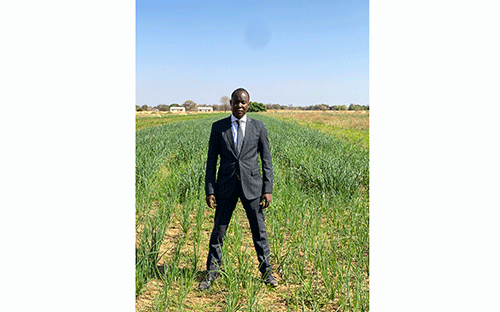OUTAPI – The food and agriculture sector of Namibia continues to play a vital role in the development of the country’s economy.
But many farmers, specifically communal crop farmers, have long struggled to access credit and high-quality farming tools. To directly address these challenges and empower farmers to increase their profitability with access to financing, high-quality farm inputs, insurance and optimised advice, member of parliament (MP) Vipuakuje Muharukua will be tabling a motion in parliament on the provision of 40% subsidies for communal crop farmers.
In his motion to be discussed on 4 October 2022, Muharukua said the small-scale crop farmers residing in villages along the water canal that runs from Epalela to Oshakati in northern Namibia should be provided with a subsidy to improve their production.
During his fact-finding mission last week in the Omusati region, he found it alarming that there is a body of free water, but there are only a few irrigation projects.
Muharukua said the motion is aimed at transforming the road from Epalela to Oshakati into a green hub of Namibia.
According to him, Namibians are entitled to pump about 6 200 cubic meters of water per second.
“I am informed that we are not anywhere close to pumping at that capacity. We need to address this matter to capacitate our people with the water provision for them to provide food for themselves and the nation,” he stressed.
He also questioned how communities along the canal may have land and sufficient water, but Namibia’s agricultural fresh produce hub, the Agro Marketing and Trade Agency (AMTA) in Ongwediva has turned into a white elephant.
“The motion is intended to address the issue. Of course, some programmes are being done, such as the horticultural production and value chain addition project, which is aimed at 1 000 Namibians countrywide. What I am proposing is not a duplication. It is for us as a country to focus on this area to ensure that we uplift the livelihoods of people in the Omusati region through the provision of subsidies,” reasoned the MP.
Namibia’s export of crops, vegetables, fruits and forestry products has grown by value in recent years. During July 2022, Namibia exported tomatoes worth N$ 24.6 million, according to the Namibia Agronomic Board.
The Ministry of Agriculture, Water and Land Reform (MAWLR)’s green scheme programme encourages the development of irrigated agronomic production with a target of reaching approximately 27 000 hectares along the
perennial rivers bordering Namibia. However, it has not met many of its initial goals, and several green scheme projects struggle financially.
Muharukua, the Popular Democratic Movement’s chief whip in the National Assembly, suggested that government could give vouchers to farmers to acquire financial assistance from banks. The MP also engaged Omusati governor Erginus Endjala.
Speaking on the crop production state in his region, Endjala said some farmers do not have access to water, while others do not have the means to boost their production or the appropriate market access.
“People are doing all they can by themselves, but with optimised financing and high-quality farm products from the government, these small-scale farmers can maximise their profits,” said the governor.
Johannes Shuuya is one of the small-scale crop farmers residing in the area alongside the canal on the outskirts of Outapi.
He is the owner of Ndinelago Vegetables, and produces and supplies vegetables to supermarkets, small businesses and individuals.
But despite his determination and ambitions to one day turn his farm into a commercial entity, Shuuya said he encounters obstacles which limit him, such as a lack of income to
keep the business afloat.
Most of the work that goes into his crop production is labour-intensive due to the lack of infrastructure and agricultural machinery.
“These are some of the challenges we experience. We are seeking assistance from the government to meet us halfway as we try to grow the horticulture sector of the country,” Shuuya said.
Muharukua said this idea is realistic and doable. “If you give N$10 000 to about 5 000 people, will that break the coffers of the government?” he asked rhetorically.
-ashikololo@nepc.com.na



